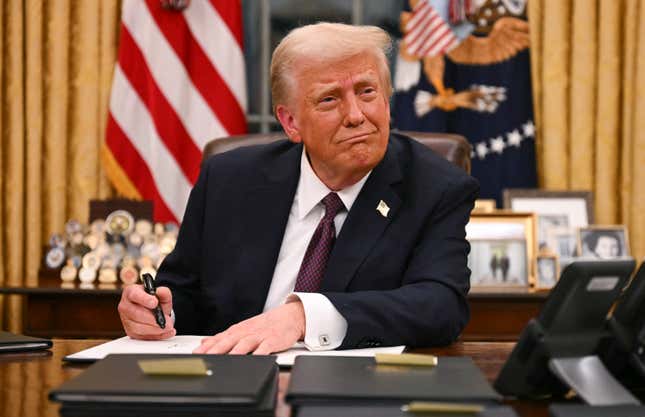
In This Story
President Donald Trump signed a highly-anticipated executive order late Thursday establishing a working group on digital assets that will be responsible for putting forward potential regulations for the sector and evaluating a national cryptocurrency stockpile.
The order makes good on promises Trump made on the campaign trail, starting with the creation of a strategic national Bitcoin reserve — and comes as the president and his family have deepening ties to and growing personal financial stakes in the crypto industry.
The White House said the order is aimed at “providing regulatory clarity and certainty built on technology-neutral regulations, frameworks that account for emerging technologies, transparent decision making, and well-defined jurisdictional regulatory boundaries.”
The group, headed by the special advisor for AI and crypto, will have 30 days to identify all regulations, guidance documents, orders, and other items that affect the digital asset sector.
Within 60 days, heads of nearly a dozen federal agencies will have to submit regulatory recommendations to the chair. And by the 180 day mark, the working group must submit a report to the president with their policy suggestions, including the potential creation and maintenance of a national digital asset stockpile.
Read more: Bitcoin and crypto have a lot of terms. We’ve got a glossary for what you need to know
This process is expected to help mainstream cryptocurrency within the U.S., as organizations from exchange platforms to traditional financial institutions have long awaited clearer regulation around the burgeoning industry.
Bank of America (BAC-1.24%) CEO Brian Moynihan said at the World Economic Forum in Davos, Switzerland on Tuesday that if the administration rolls out new rules, the banking industry will become an active player in offering crypto payments. Moynihan added that the second-largest U.S. bank by assets is prepared to enter the field when the time comes.
Speaking on a panel in Davos, Coinbase (COIN-3.06%) CEO Brian Armstrong said that legislation in Congress will bring fresh investment to cryptocurrencies. And Binance CEO Richard Teng echoed those sentiments, predicting that the crypto market will hit a new all-time high this year thanks to “much clearer regulation” from the Trump administration.
Bitcoin, the largest cryptocurrency by volume, was up almost 4% Friday morning, valued at $105,423 apiece.
Other key parts of the order included the rollback of a Biden-era executive order that encouraged the government to research and develop a central bank digital currency. Last year, Trump vowed to prohibit the development of such digital assets to “protect Americans from government tyranny.”
In the order, the White House said central bank digital currencies “threaten the stability of the financial system, individual privacy, and the sovereignty of the United States.”
Over the past year, Trump has put his name on a number of crypto projects, most recently a $TRUMP meme coin launched just days before his inauguration. Last October, Trump launched World Liberty Financial, a alongside his sons and other business partners. That platform has already sold several collections of non-fungible tokens, and made a number of additional cryptocurrency purchases on Monday.
A pro-crypto SEC
In another move welcomed by the crypto industry, the Securities and Exchange Commission late Thursday announced that it was revoking accounting guidance requiring companies holding digital assets on behalf of others to account for them as liabilities. This made it more expensive for them to do so.
That came on the heels of the SEC’s launch of a “crypto task force,” tasked with developing a “sensible regulatory path that respects the bounds of the law,” the agency said in a press release. The task force will be led by Commissioner Hester Peirce, nicknamed “Crypto Mom” after she dissented from the SEC’s rejection of a bitcoin exchange-traded fund.
That announcement, the first published under Acting Chairman Mark Uyeda, also bashed the SEC’s prior actions under Chair Gary Gensler, a fierce crypto critic who resigned on Monday.
Gensler and his SEC drew heavy criticism from crypto advocates for their hardline stance on the industry. Under his leadership, the SEC took on high-profile cases against a number of major crypto players, such as Coinbase and Binance; 18% of Gensler’s SEC’s total complaints were related to crypto.
Uyeda, a commissioner since 2022 with a term expiring in 2028, was named acting commissioner earlier on Tuesday. In November, back when he was seen as a contender to take over the SEC as chair, he told Fox Business the SEC’s “war on crypto must end.”
If confirmed by the Senate, he will be replaced by Paul Atkins, who Trump has nominated to lead the SEC. Atkins, a consultant who was last employed at the SEC under George W. Bush’s administration, is a friendly face to the crypto lobby. He leads Digital Chamber’s Token Alliance, which advocates “best practices” for the crypto industry, and has opposed massive fines on companies that violate securities law. Digital Chamber’s stated goal is to “promote the acceptance and use of digital assets” and blockchain tech.
Atkins has also expressed support for dismantling Dodd-Frank, which enhanced federal regulatory authority following the disastrous 2008 financial crisis.
— William Gavin contributed to this article.